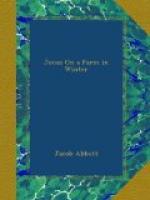“Get home, Franco!” said Jonas again; and, stooping down, he took a piece of hardened snow or ice from the road, and threw it towards him. The ice fell, before it reached Franco, and rolled along towards his feet, which made him scamper along a little farther; and then he stopped, and turned around, and looked at Jonas, as before.
Jonas began slowly to turn backwards, keeping his eye on Franco.
“It’s a hard case, Franco, I acknowledge. If I had a barn of my own, I’d let you sleep in a corner of it; but I must obey orders. You must go and find your master.”
So saying, Jonas turned round and walked slowly home. Just before he turned to go into the house, he looked back, to see what had become of the dog. He was standing motionless in the place where Jonas had left him.
“I wish the farmer would let me give him a bone,” said he to himself; and then he turned away, and walked slowly around to the barn, to fodder the cattle.
That night, just before bed-time, he went to the front door, and looked out into the road, and all around, to see if he could see any thing of Franco. It was rather dark and windy,—though he could see the moon shining dimly through the broken clouds, which were driving across the sky. The roads looked black, as they do about the commencement of a thaw. Presently the moon shone out full through the interstices of the clouds. Jonas took advantage of the opportunity to look all up and down the road; but Franco was nowhere to be seen.
The next morning, however, when he went out into the stable to give the cattle some hay, he found Franco in his old place, under the General’s crib.
“Why, Franco,” said Jonas, “how came you here?”
Franco said nothing, but stood looking up into Jonas’s face, and wagging his tail.
“Franco,” said Jonas, “how could you get in here?”
Franco remained in the same position; the light of the lantern shining in his face, and his tail wagging a very little. He could not tell certainly whether Jonas was scolding him or not.
Franco remained about the barn until breakfast-time, and then Jonas, at the table, told the farmer that he tried to drive the dog away the night before, but that in the morning he found him in the barn.
“I don’t believe you really tried,” said the farmer’s wife. “I can drive him away, I know,—as I’ll show you after breakfast.”
Accordingly, after breakfast, putting on hastily an old straw bonnet, she went out into the yard and took a small stick from the wood pile, to use for a club, and then called to Franco.
“Franco,” said she, “come here.”
Franco looked first at her, and then at Jonas, who was standing in the door-way, as if at a loss to know what to do.
“Go, Franco,” said Jonas.
The farmer’s wife walked out in front of the house into the wind, calling Franco to follow. She then attempted to drive him along the road, much as Jonas had done. She brandished her stick at him, and, when she had succeeded in getting him as far from her as she could, by stern and threatening language, in order to drive him farther, she threw the stick at him with all her force.




